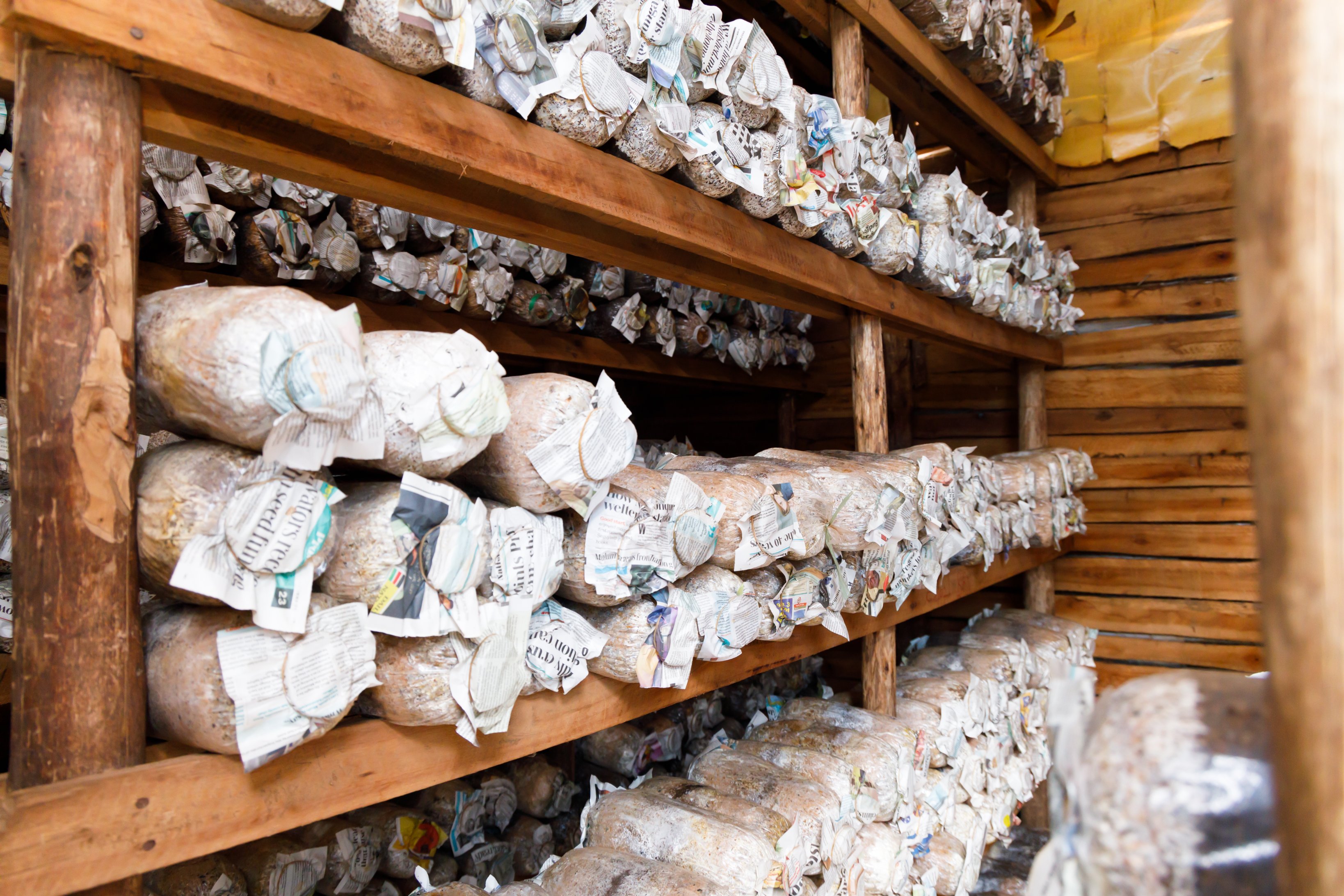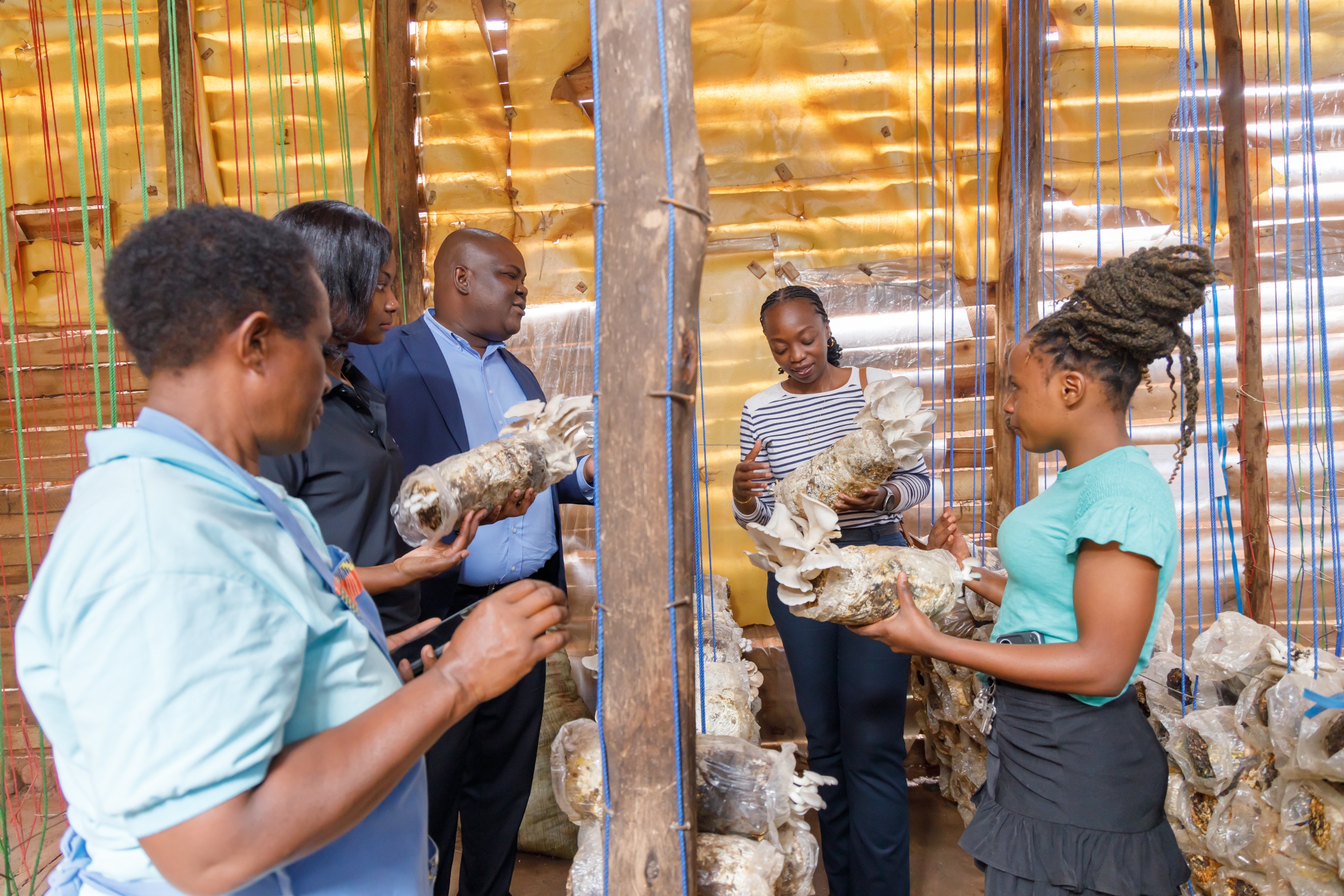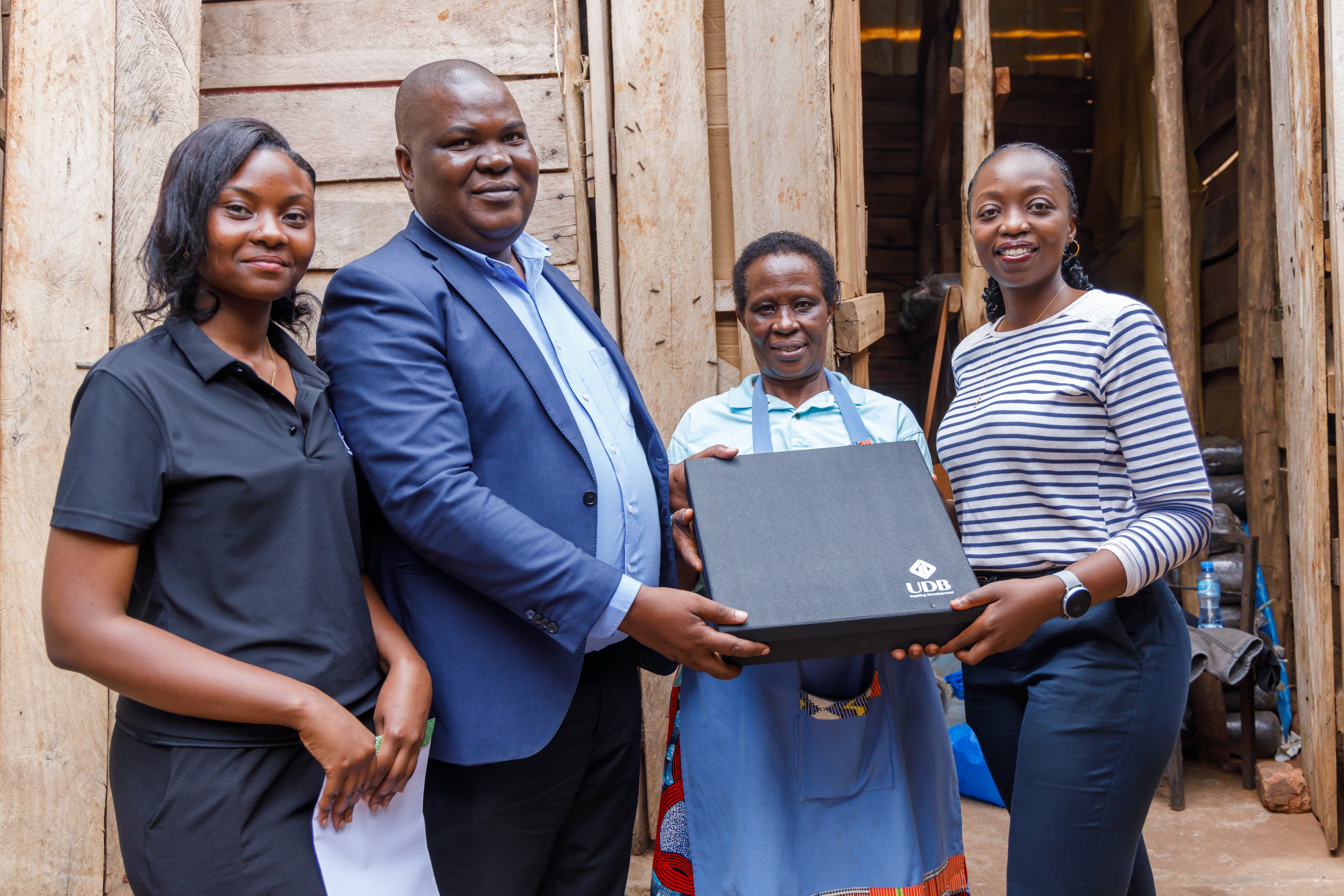Development finance as a catalyst to support SMEs and unlock inclusive transformation
Ms. Byaruhanga (L) and her team pose for a photo with UDB staff during a visit
Sponsored Content
Small and Medium Enterprises (SMEs) in Uganda and beyond have demonstrated great potential to improve livelihoods through income generation, and job creation, especially among youth and women. At the same time, SMEs promote diverse business activities across agriculture, manufacturing, and services, helping economies be more resilient. They also foster innovation and entrepreneurship, which is essential for competitiveness and economic dynamism. All these attributes reflect in Ms. Asenanth Byaruhanga’s entrepreneurial acumen which has enabled her to grow a mushroom farming enterprise for the last 20 years.
What began as a passion has grown into Byabomuka Growers Association Mushroom Value Chain, a Community Based Organization that produces fresh mushrooms, dried mushrooms and mushroom powder, as well as innovative items like smearing jelly, a cough remedy mixture, mushroom bread, and porridge. She sells her mushroom to hotels, supermarkets, and markets like, Nakasero and Nakawa among others. Additionally, she generates income from selling mushroom raw materials (ready gardens) to fellow mushroom farmers.

A Section Of A Mushroom Garden At Ms. Byaruhanga's Farm In Kireka, Kampala
After completing her studies at Nkumba University, she ventured into retail business before rearing poultry. Then a window to learn mushroom farming opened, which she took up at the National Laboratories Research Institute (NaLRI) in Kawanda.
A sum of Shs 80,000 was all the capital she used at the initial stage of her enterprise back in 1995, starting from a small corridor at her home. Resilience and her desire to grow her business enabled her to expand further in 2002, acquiring another piece of land in Kireka C where her farm is currently located. Over the years, she has trained over 40 local women in mushroom cultivation.
UDB support
The Association approached Uganda Development Bank (UDB) in July 2022 for credit support. At the time, their biggest need was expanding their business. To be eligible, she needed to formally register her business and be tax compliant which she did. They got the first loan instalment in 2023. UDB supported her project with a credit facility worth UGX 65 million for infrastructure development and purchase of raw materials.
“We thank God that the loan took us to another level and we are glad we were able to clear it within one and a half years,” says Ms. Byaruhanga.
The farm was able to expand vertically given that their space was very limited. The financing was for working capital including harvesting water tanks, cropping room intubation and a store. She applauded the terms for the loan.
“UDB gave us a good interest rate. They also gave us a grace period of nine months. That is good for a development bank,” she says.

Ms. Byaruhanga Guides A Team From Udb On A Tour Of Her Mushroom Farm
Impact
UDB prioritizes development impact because its core mission is to promote sustainable socio-economic development through provision of financial support and non-financial services such as business advisory. They aim to stimulate private sector growth for structural economic transformation through improved competitiveness, job creation, increased government revenue and foreign exchange earnings. These outcomes contribute to improved living standards and household incomes.
“With UDB’s financial support, Byabomuka Growers Association has been able to empower our 200 members by enhancing their household income. When members received training in mushroom cultivation, their incomes increased and general wellbeing improved,” adds Ms. Byaruhanga.
She says Association members have also benefited from training in spawn production - creating a grain or sawdust mixture colonized by mushroom mycelium from a pure culture, which is then used as "seed" to cultivate mushrooms on a larger substrate like compost.
There is also the nutritional benefit to mushrooms, which saves households medical expenses.
“I thank God that even when my children were young, I never had to spend on hospital bills, because they rarely fell sick. Mushrooms are not only a source of income. Whenever a family is not spending money on medical bills, it is saving money that could do so many other things. Mushrooms have zinc iron which has nutritional elements,” Ms. Byaruhanga says.

Ms. Asenanth Byaruhanga (2nd R) Poses With Udb Staff Who Paid A Courtesy Visit To Her Farm During The Customer Week In 2024
The bigger picture
According to Ms. Byaruhanga, the demand for mushrooms and their value-added products in Uganda is surging. Today, she is unable to satisfy it, the solution of which is scaling production.
“There’s equally a lot of demand for button mushrooms. At the moment, supermarkets are importing these from Nairobi and South Africa. We acquired training from Nairobi on how to grow them but when we tried, they didn’t meet the required standards. Button mushrooms require temperature-controlled growing units. They need a lot of coldness, which requires ample space of about an acre, to allow constant supply.”
To increase their production capacity, the Association needs to expand their operation to an end-to-end processing facility that manages the product's entire journey from its source in the field to a finished, value-added, and market-ready form. Such a facility would encompass on-site growing, harvesting, primary and secondary processing, packaging, quality assurance, administration, training, branding, and distribution, transforming mushrooms into higher-value products for consumers and wider markets.
This implies more space (land), equipment, working capital and raw materials. The facility will make the enterprise a certified producer, increasing their competitiveness both on the regional and international market.
Ms. Byaruhanga says actualizing this dream requires capital – financial and assets – needed to scale production and add value to their mushroom products.
“What capital does for businesses like ours is that it accelerates them to grow quickly. If we got sufficient capital, you would see a very big mushroom processing plant, because we have the vision in our mind, we have run the numbers and there’s more demand than we currently meet,” she said.
An increased capacity like the one she envisions with the new facility in place, would increase the number of jobs further. The business will also grow its monthly revenue threefold from the current UGX 6m.
The private sector, especially SMEs, is essential to ensuring sustainable development in Africa. SMEs play a central role in wealth creation and sustainable employment, which is critical to addressing the continent’s demographic challenges. In addition, a vibrant private sector reduces economic dependence on a few exported resources and promotes innovation tailored to local needs. Yet Africa’s productive sector remains largely informal, and formal firms, which are often small, suffer from low productivity.
Micro, Small, and Medium Enterprises (MSMEs) make up 90 percent of Uganda’s private sector, serving as the backbone of the economy, according to figures by the Ministry of Trade, Industry, and Cooperatives. These businesses employ over 3 million Ugandans, generate more than 80% of the manufactured output, and contribute about 75% to the Gross Domestic Product (GDP).
Uganda Development Finance Summit
To sustainably strengthen African economies, there is an urgent need to overcome the barriers faced by entrepreneurs. One approach is to focus solely on improving the business climate. The logic is to provide a harmonious framework to encourage business development without directly interfering with their activities.
The need to rethink financing necessary to accelerate growth for SMEs in Africa, is among the many discussions that will take centre stage during the Uganda Development Finance Summit scheduled to take place on 1st and 2nd September 2025 at Speke Resort Convention Center in Munyonyo.
The Summit, the first of its kind in Uganda, seeks to unite government officials, development partners, financial institutions, private sector representatives, and civil society to forge collaborative partnerships and innovative financial solutions that address Uganda’s development needs.
With traditional funding sources, such as aid and concessional finance, falling away, Africa is increasingly relying on global debt markets to address its development needs. However, securing funding from international financial markets has come with its unique challenges, as some African nations are compelled to pay higher rates than other sovereign borrowers. In contrast, others have restricted access to these markets. This situation has led to a financing gap that makes it challenging to avail capital to the public and private sectors, impeding economic growth and transformation on the continent.
“UDB recognizes the need for a multi-stakeholder approach to address these pressing issues effectively. The Development Finance Summit presents a platform to showcase flagship projects and highlight the potential and prospects of Uganda and the region,” says Sumin Namaganda, Senior Manager Corporate Affairs, Uganda Development Bank.
Byabomuka Association is one of the SMEs that UDB has supported under its Special Program segment established in December 2021, targeting SMEs, youth, and women enterprises. Special Program aids the implementation and management of interventions and innovations targeting eligible businesses, from startups to existing enterprises, with appropriate financial and non-financial solutions. The interventions under this segment play a crucial role in promoting inclusive growth and development.
Over the last three years, the Bank has approved over 300 projects under Special Program. With this innovative solution, the Bank continues to generate significant socio-economic development impact to improve the livelihoods of Ugandans. Specifically, the Special Program intervention generated and maintained over 2,000 jobs as of December 2024. Additionally, the supported projects under this segment generated output value of UGX 1,215 billion, tax revenue contribution worth UGX 64.73 billion and US$ 59.4 million in foreign exchange earnings.
“DFIs play a crucial role in derisking sectors such as energy and infrastructure, thereby attracting commercial capital and private enterprises. However, without meaningful dialogue with policymakers to strengthen public-private partnerships, capital to finance Africa's public sector or help African businesses grow and create more jobs, will remain expensive or elusive,” Namaganda says.